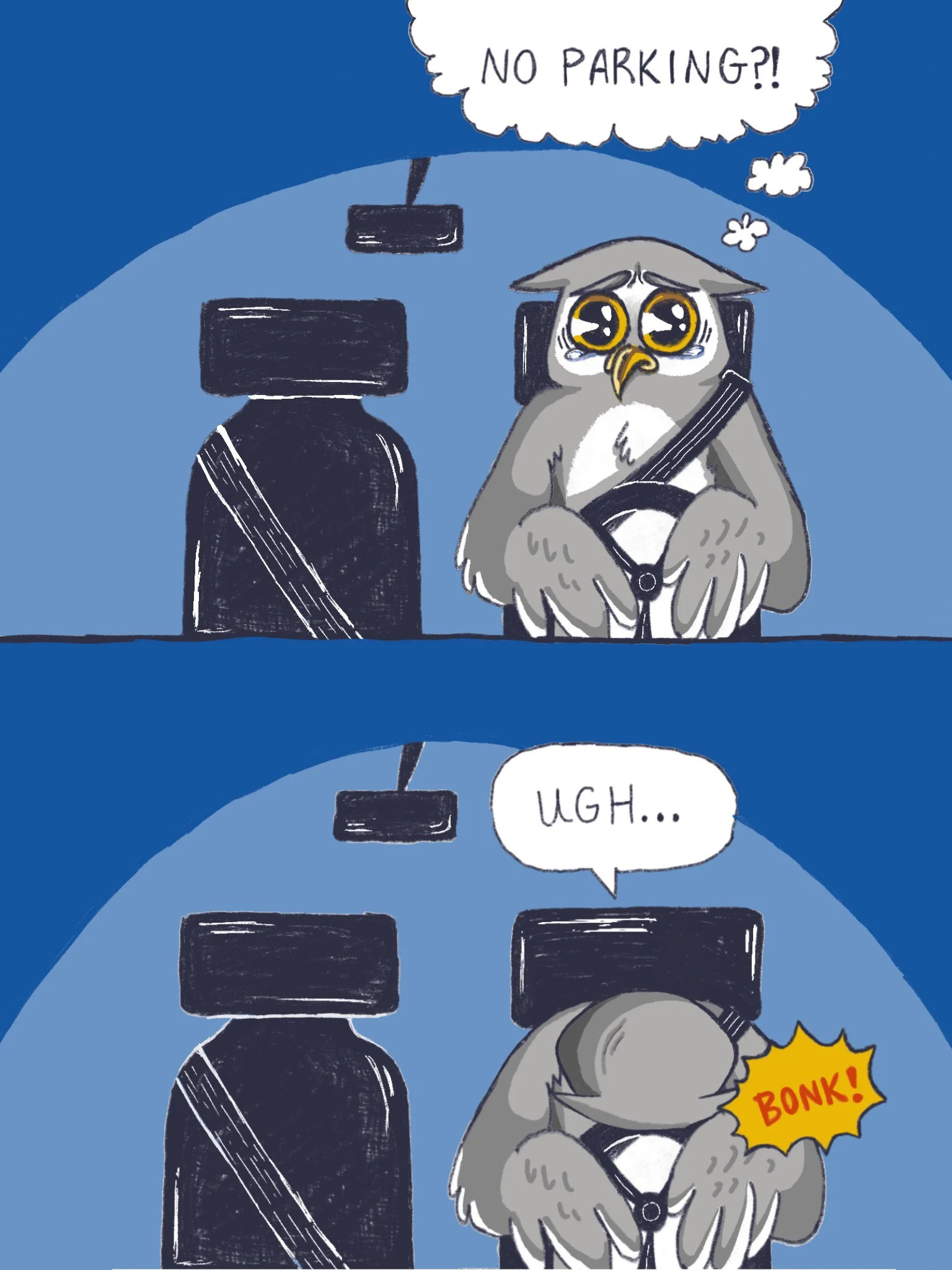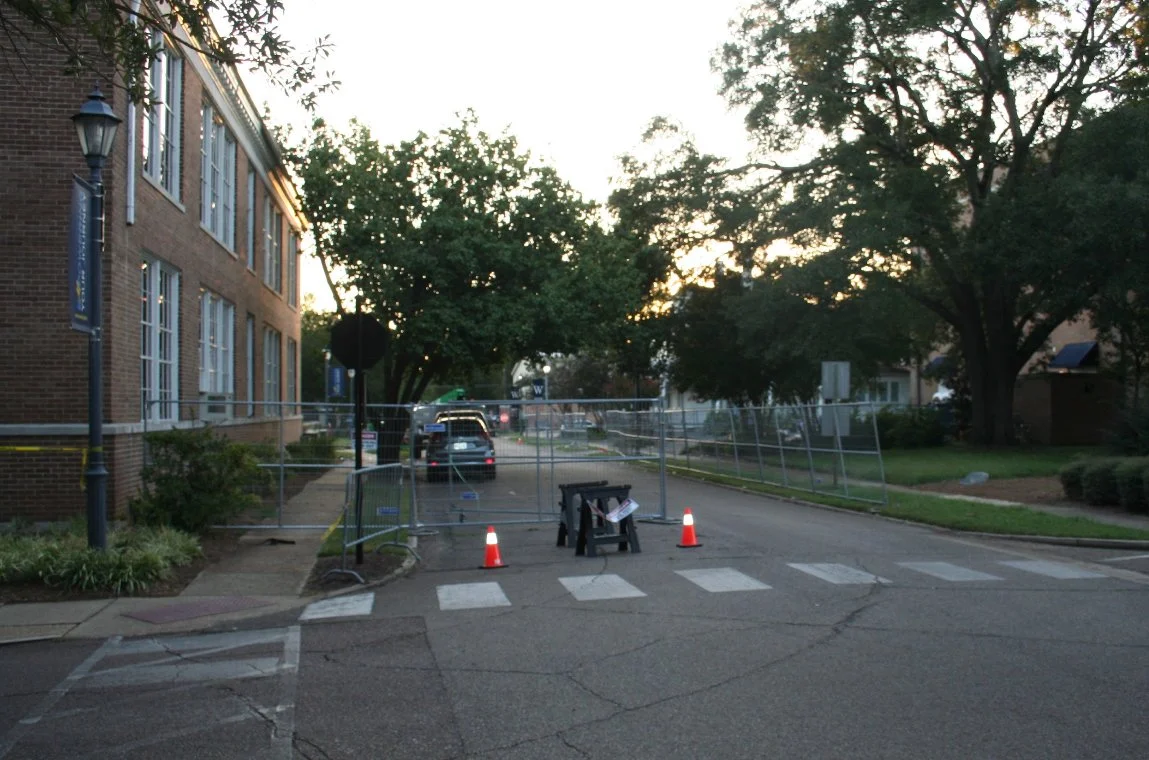Emma Caroline Brown
Editor
Student interview by Amelia Bowers
The 2025 fall semester is entering its sixth week of being in session, but students and faculty still struggle to find parking amid construction work and an increase in driving across campus.
There seems to be an influx of traffic zipping around campus, but students driving from building to building has become a new norm on The W’s campus. Fewer students seem to be walking from class to class and instead are opting to drive from one spot on campus to another, which in turn creates the challenge of finding parking places across campus.
Dr. Kristi DiClemente, the department chair and associate professor of History, conducts her classes in Painter Hall, which is located at the very front of campus. She has noticed students choosing to drive on campus rather than walk, especially from one end of campus to another.
“I do know that our students do drive from building to building more than they did when I first got here,” Dr. DiClemente said. “I’ve been here for about 10 years, so I would say they are definitely driving from building to building, and I think they expect to have parking in every building, which of course isn’t always possible because we are a small campus.”
Artwork by Katelyn Klark
While The W’s parking pains pale in comparison to parking at Mississippi State University or the University of Alabama, students still feel the inconveniences caused by limited, unavailable or distant parking spots or lots. Parking during the day may not be too much of a worry for students and faculty, but parking at night is different.
Whether you park on the street or on campus, there are always risks. However, nighttime parking may be riskier or more unnerving than dealing with daytime cross-campus walks or lot unavailability.
Audrey Mitchell, a senior math major, is an on-campus resident in Hasting-Simmons residence hall, which is one spot where parking is always scarce. When available parking at the dorms is nonexistent, Mitchell parks in the lots next to the library, Poindexter Hall or Shattuck Hall. These parking lots are the closest to Mitchell’s dorm, and while street parking is sometimes available, it is not her top choice.
“If you park outside of campus, it’s more likely that your car is going to get broken into,” Mitchell said. “You can encounter any of the people who are out on the street at night, which is dangerous for several reasons, because they’re either drug users, could be weapon owners, lots of things like that.”
Even parking on campus at night can be concerning for some students. All of The W’s drive-through gates close at 7 p.m., except for the front campus entrance, and people not affiliated with the university sometimes walk onto campus after dark. There is a gamble to be made with either choice of parking on campus or parking on the street — it is just a matter of what is accessible or convenient for a resident student.
However, parking on campus has to be done in line with parking guidelines. Parking violations on campus, whether it is parking against the flow of traffic, parking in faculty spots outside of permitted times or creating makeshift parking in hatched spots, can be given at any time.
Parking tickets range from $50 to $200, and wheel-lock devices or other immobilizing methods can be used when needed. A full list of parking violation penalties and guidelines can be found at muw.edu/police/traffic/.
The W’s police chief, Randy Vibrock, said that so far this semester, the bulk of citations given to students has been for not having an official decal or having an expired decal. The W’s parking decals are issued each year and are valid for a full academic year.
While the parking decal is necessary for those working for or attending The W, it does not guarantee a parking space on campus.
In her almost 10 years of being at The W, this is the first time DiClemente did not purchase a parking pass. However, she lives a few blocks off campus, so walking is her preferred way to commute on campus, especially amid the ongoing construction projects.
“This semester, I haven’t even bothered [buying a parking decal] yet, because the construction has taken away enough parking spaces that I’d rather leave them for my colleagues who have to drive in.”
The W’s historical status does put limitations on the types of constructions and demolitions that can take place on campus, including paving new parking lots. Recent face-lifts to older campus buildings have put further strain on the parking situation, with faculty spots at Painter being blocked off and the student lot at Fant Hall being completely blocked off because of construction and renovation projects.
Painter Hall’s on-street parking during its recent construction.
Photo by Ray Brothers
During the summer, construction on Painter Hall took place as new roofing was added to combat leaky ceilings and hazards that could come from leaks or damage. These repairs just wrapped up last week, but before the fall semester started on Aug. 20, students were notified that Painter Hall would not be in use for a few weeks. Classes and meetings in Painter were then shifted to other buildings nearby, such as Parkinson Hall and Reneau Hall.
Vibrock wants students to understand that projects such as the ones ongoing at Painter and Fant can create inconveniences of many kinds, especially parking. However, Chief Vibrock and The W’s police department tries to issue timely alerts to let students, faculty or staff know if any parts of campus will be blocked off, restricted or unavailable for a set time.
“What we try to do at the police department is that we try our best to communicate with contractors so we can get information out to the campus so individuals can plan ahead for any inconveniences they may encounter due to parking because of construction,” Vibrock said.
DiClemente said she saw that all but one student knew to attend classes in substitute classrooms during Painter’s repairs. Out of the more than 2,000 students who attend The W, the success rate was high in notifying students. DiClemente credits this to how well The W and The W’s police department communicated with the student body, faculty and staff.
“They sent out emails, did W Alerts, they put up physical signs outside,” DiClemente said. “They did a great job letting students know. They tried to hit students in every direction.”
Even when construction or renovations are taking place, convenient parking is usually not available, especially at the front or middle of campus.
Vibrock said that parking availability is the main question The W’s police department is asked. If any issues are found with parking availability, Vibrock says those issues and concerns make their way to him or the police department.
“I encourage anyone who has questions or concerns about parking to bring those concerns to me,” Vibrock said. “I will listen to every question and talk through it, and if we come up with a reasonable solution, we’ll try to put that in place.”
If you have any issues or questions about parking, you can visit The W’s police department in McDevitt Hall or email the department at muwpolice@muw.edu.
The W and its police department are working toward creating a system that highlights available parking and includes maps of the bigger on-campus lots. This system would benefit new or transfer students, as well as visitors or those attending events on campus. Informing people, especially students, of parking availability could cut down on parking citations and prevent parking from becoming another stressor when trying to make it to class on time.
Vibrock recommends students arrive 30 minutes before their class, while DiClemente stresses that there will not always be a convenient space for everybody. There have been ideas in the past of reconstructing The W’s streets to add more parking for students, but Mitchell believes students would best benefit if the faculty had a big, assigned lot.
“I think there’s a lot of green spaces near residential areas,” Mitchell said. “I think that’s more important if they were to have an assigned lot for faculty — I feel like that could have been better, or I don’t know, just decreased green spots near residential areas.”
As of now, there are no official plans to increase parking. If you want to find a good parking spot on campus, you might want to plan and arrive on campus earlier than usual or make time to walk.


